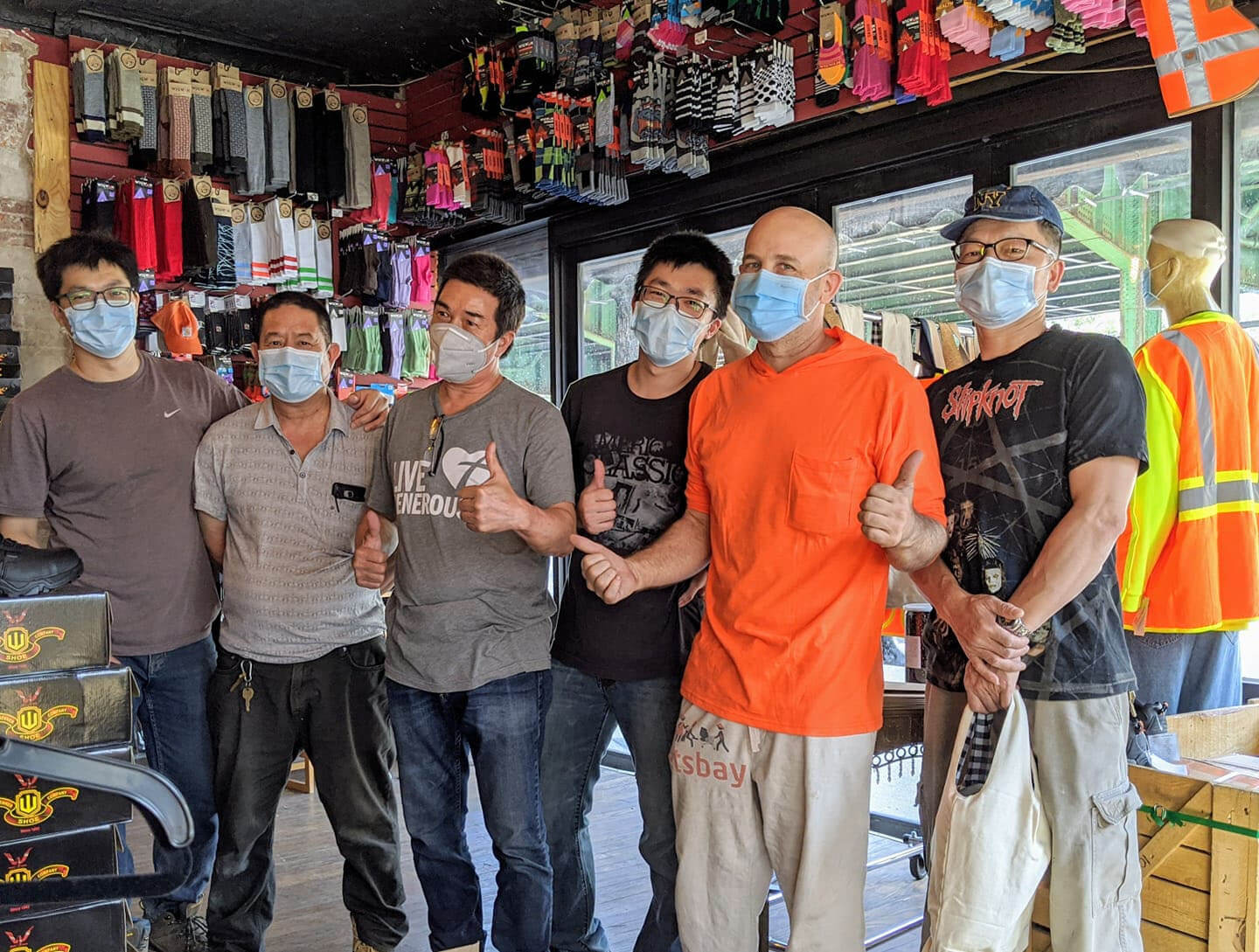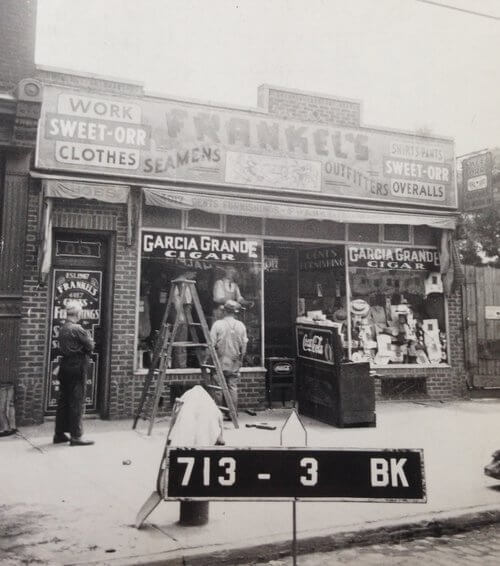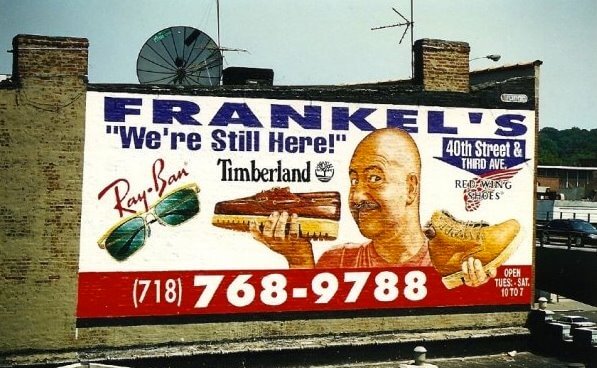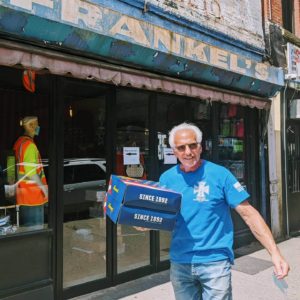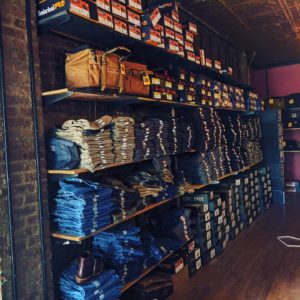Founded in 1890, Frankel’s began by selling clothes and goods to union workmen, such as longshoremen and ironworkers on the corner of Third Avenue and 40th Street.
“My father, Marty, named me Erik to sound more Norwegian,” chuckles Erik, great-grandson of the founder. Erik, who spent years living in Hanoi, now lives above the store.
“Many people don’t know it, but Brooklyn used to have a huge Norwegian population.”
“What kind of things did the store sell?”
“Longshoreman gear: Meat hooks, icepicks, peacoats, radios, Levi’s, Wranglers, and insulated clothing. Even until 1963, Brooklyn was a major port. The waterfront was bustling back then. The ships came in from all over the world, there were movie theaters, and bowling alleys, on two sides of the street.”
What happened?” I ask.
“The Brooklyn ports closed; that business went to New Jersey. At first, we thought it was over for us. Then we switched our inventory and started supplying construction clothes and work shoes.”
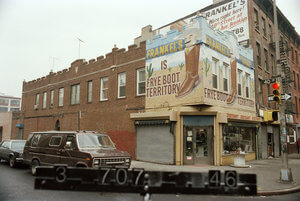
“You reacted quickly to the change.”
“We made fast changes and were incredibly lucky. At that time, we started supplying items for ironworkers. You could say that our goods were used by the people who built the expressways, the NYC bridges, and the skyscrapers. We are a part of the history that built this city. Even until today, we supply NYC ironworkers, electricians, plumbers, and people of all trades with items like union made Thorogood Boots.”
Then, Erik says, a few years ago, his father wanted to open a place nearer to where he lives in New Jersey.
“Sometimes, it would take him two hours to find parking. Not to mention the tolls and hardship of travelling back and forth every day. Then he closed the Brooklyn store.”
That closing was mourned by long time Brooklynites, but it has lasted only two years.
“I decided to carry the store’s traditions forward, so I reopened it. Now we have two stores. But it’s hard for a small business to stay relevant,” Erik says.
Having lived in Vietnam, Erik speaks Vietnamese. He also speaks Burmese, Thai, and Spanish. Erik tells me that Marty speaks twelve languages. They are a very international family.
While in Vietnam, Erik helped local businesses with the operational logistics, such as warehousing, shipping, and bookkeeping. He even started a non-profit, called Arekind which is still active in Saigon.
“Now I’m hoping to bring this kind of training back to NYC. Give kids jobs. Instead of just sweeping, the kids could learn things, cut leather, dye, glue stones.”
Erik also wants to create a place where craft workers can make leather products– shoelace flags, leather wallets, and bags.
“You need a workshop to make leather goods. If you want to make goods you can sell in our store, you can use our machines, use our dyes. My goal is to help people create sustainable businesses.”
“It’s more than just money for you. It sounds like you have your hands in many things,” I say.
Erik responded: “We could just rent out the store and make more money. But here’s the thing. People have an emotional attachment to Frankel’s. Some old-timers come in just to tell stories about my grandfather and great-grandfather. They bring the shoes my grandfather made for them – just to show me. Believe it or not, my grandfather used to cook steaks in the back of the store for customers. He even used to give them drinks – the longshoreman,” he pauses for a moment. “And police, too” he says snickering. “It’s nostalgic; having made such an impact on people’s lives.”
“That sounds very cool.”
“Then he’d even drive people to the subway. But you know, he wasn’t an angel; he could be a little abrasive, too.”
Initially Frankel’s was across the street from where they are today.
“They knocked our original store down to build the Gowanus Expressway.”
“You survived it all,” I say.
“People come just to buy something – anything. They’ll come in to shoot the breeze and then just buy a pair of socks.”
“How do you deal with competition – like from Amazon?”
“It’s difficult to compete with Amazon. Next day shipping, unlimited inventory. But now, you can buy our stuff on Amazon, too. They take 15-20%, though.”
“But you know,” he adds, “some people like real feedback; they like to try stuff on. And they like to come in person, talk about the construction projects they were on years ago.
The bridges and expressways they’ve built. They love to comment on the union stickers pasted up by the workers who’ve bought items from us faithfully over the years. For people who want to talk to a human being when they buy something – see what it looks like in a mirror – there’ll always be Frankel’s,” adding, “and now in two locations.”
Frankel’s Website: https://www.frankelsny.com/
Location(s): Frankel’s (Brooklyn)
3924 3rd Ave
Brooklyn, NY 11232, US
+1 929-478-1546
support@frankelsny.com
Frankel’s (NJ)
86 North Ave
Garwood, NJ 07027, US
+1 718-768-9788
support@frankelsny.com
Mike Fiorito: www.callmeguido.com

